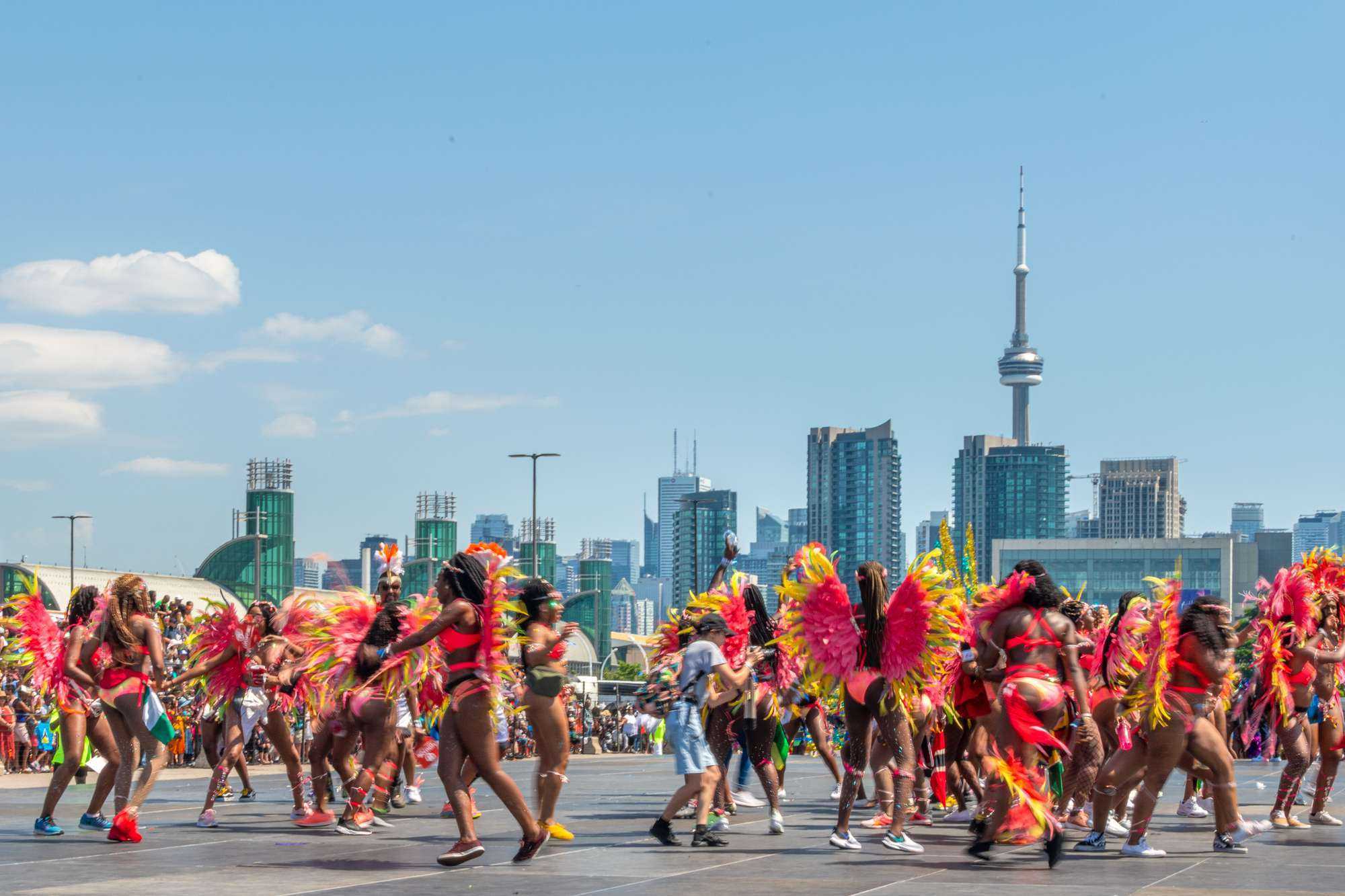on
BY SIMONE J. SMITH
Toronto Carnival cancelled for the first time in 52 years!
Masquerade bandleaders say the coronavirus pandemic made cancelling the 2020 Toronto Caribbean Carnival unavoidable.
Do you remember how you felt when you ready these headlines? For many, it was a sinking feeling in your stomach that you could not describe. Yet, another part of our summer that was taken away.
I HAVE GREAT NEWS FOR YOU!
One thing I have learned is that in everything you must adapt. You have to take what life has given you and make the best of it, and this is exactly what Toronto Caribbean Carnival has done this year.
Now that we can have small groups of people together, on Carnival weekend, and leading up to Carnival, the team at Toronto Caribbean Carnival are going to bring the fete to you.
Think about it; it is a long weekend, and for most of us, we will be gathering with friends and family to hang out (staying within provided guidelines), and relax, have a few drinks and vibe for a bit.
Now, you have the best Dj’s in the world, playing at your family event. FOR FREE! That’s right, you can still put on your partial, full or DIY costume because they are having a virtual road march with prizes!
There have been a lot of question about how Toronto Caribbean Carnival was going to pull off their evolved virtual platform this year, so I went right to the source.
Last Friday, I had the opportunity to speak with Aneesa Oumarally (Toronto Caribbean Carnival, CEO), and we reviewed a few topics, including the impact of COVID-19, and how the Carnival continues to evolve and expand, even through trouble times. First, let’s take a quick trip down memory lane.
“The past always informs the future.”
For the past 52 years, the Toronto Caribbean Carnival (formerly Caribana) has delivered an exciting summer festival featuring elaborate costumes, Caribbean music, and foods from our beautiful islands.
It was the summer of 1967. The newly created Caribbean Centennial Committee had just announced Caribana Week, and the city of Toronto was preparing for a weeklong festivity from August 5th – 12th, at Olympic Island. This was going to be one of the first Caribbean festivals held outside of the actual Caribbean. It was going to be a time to share West Indian and black Canadian culture and traditions with the Toronto community. It represented the cultures of the ten main Caribbean islands in addition to Bermuda and Guyana.
On the first day, 32,000 people showed up to kick of the carnival style parade. They came in their bright and lavish costumes, exquisitely decorated floats, and steel drums. This was the good old days when the parade was open, and anyone could join the celebration. It rained that day, but that didn’t stop the revellers from coming back to join the celebration on the Sunday. The success of the festival attracted the world audience. Eventually, Caribbean leaders, as well as stage and musical acts took notice of this historic event, and this one-off celebration became an annual event.
Everything has changed, and that was the first topic of discussion between Aneesa and I.
“You are never going to have the same feeling or momentum, but people recognize that there is a difference now,” Aneesa began.
”It has been tough, I won’t lie, and for a few reasons. The carnival is supported in part by federal, provincial and municipal funding, but with all that is happening, we have lost numerous sponsorships, and we are currently working with a skeleton staff of four or five key people.
Then of course we have to think about the small and large industries that rely on the event for their economic needs: from the music trucks to the artisians (wire makers, costume designers, jewellery designers), it has not been easy, and everyone has had to make adjustments.
We had to make a decision. We had to focus on the recovery of carnival for the community. Everyone is happy that we made the transition to a virtual carnival
It is the only way to remain relevant. People are happy about this.”
During our talk, Aneesa reminded me of an important fact.
“This is a multigenerational thing, and this presents a problem for us. We have people who are 70 and 80 years old, and kids from 1 to 10 participating. We had to figure out how we were going to reach all of the demographics and make everyone happy.
We are so happy that the community has been so supportive. What surprised us was the support that we were getting from the international community. People were impressed that our Prime Minister acknowledged our event. The premier said something to Toronto citizens, and Mayor John Tory declared that the month of July was Toronto Caribbean Carnival Month!”
What could be the same this year? Of course, it has to be different!
What is exciting is to see the changes that Toronto Caribbean Carnival has made. They will be having weekly programs include Microbusiness Mondays, Wellness Wednesdays, Carnival Saturdays and Calypso Tent on Sundays.
“This year we are doing symposiums,” Aneesa tells me excitedly. “Now our scholars can participate in carnival. It is called Free up Yuh Self Symposium, and we already have an international audience that has registered.”
The health-focused Wellness Wednesdays will highlight Carnival Spice and Socacize creators Shakera Martin and Ayanna Lee-Rivers, respectively, who adapted dancing to soca into workouts and boot camps. Carnival Saturdays will host virtual parties, and Calypso Tent on Sundays will feature live performances.
“For Junior Carnival Week, we again partnered with Ontario Science Centre, and this year they hosted virtual experiments for kids, like creating an oobleck monster. That involves pouring cornstarch on a speaker and letting it dance to soca music while creating a unique pattern. It is truly innovative. STEM is being brought to children through the Carnival.”
Let’s give you a quick run down of what you are to expect this year. You can get more details by visiting their website at https://www.torontocarnival.ca/
July 22 @ 7:00 pm – 8:00 pm
Wellness Wednesday – IslandWukkout
Virtual
July 23 @ 7:00 pm – 9:00 pm
Free Up Yuh Self: Disrupting Gender, Sexuality, Race and Finding Agency in Carnival
Toronto Carnival Symposium presents an important panel: “Free Up Yuh Self: Disrupting Gender, Sexuality, Race and Finding Agency in Carnival”. Register early
July 25 @ 3:00 pm – 6:00 pm
Freedom Mas Carnival Virtual Event
Virtual
July 25 @ 9:00 pm – July 26 @ 12:00 am
The Prelude to The Virtual Road!
Virtual
The Prelude to The Virtual Road! We’re just one week away from the finale event on August 1st and they wanted to prepare you for the road with The Prelude! There will be three local DJ’s, three hours of soca, and all of the vibes.
See you on Saturday at 9pm! Streaming on all social media platforms
July 31st, 2020
Toronto Caribbean Carnival has partnered with a radio station in Grenadian. They will be having a party with Grenadian artists. That’s right. A Jab Jab party the night before Carnival
August 1 @ 9:00 am – 10:00 pm
This event Celebration is a virtual experience on the road, and this is your opportunity to showcase a costume for a “Road Experience.”
It is going to be 13 hours of soca music. They are going to start with DJ’s in Australia, Japan, Europe (Germany, UK), Caribbean, The America’s, and then finally right back home here in Toronto. This was the brainchild of Dj Invinceable International.
Some artists will be performing on the road. You can participate. It’s Free!
Limited ZOOM links will be made available and with preference to those in partial, full or DIY costume. Register now!
Otherwise, you can still listen to the party at home or with friends on our TWITCH feed while we take you on a Virtual Road into the night!!!
Twitch Feed: http://www.twitch.com/torontocarnival
Updates: http://www.instagram.com/torontocarnival.ca
“Finally,” Aneesa tells me, “We want the community to get involved by posting #myTorontoCarnival, and telling us what does your Toronto Carnival mean to you? You can post this on Toronto Caribbean Newspaper social media pages, or Toronto Caribbean Carnival social media pages. Don’t forget to tag us!”
Toronto! Get ready to wine!
Stay in the loop with exclusive news, stories, and insights—delivered straight to your inbox. No fluff, just real content that matters. Sign up today!
We, as humans are guaranteed certain things in life: stressors, taxes, bills and death are the first thoughts that pop to mind. It is not uncommon that many people find a hard time dealing with these daily life stressors, and at times will find themselves losing control over their lives. Simone Jennifer Smith’s great passion is using the gifts that have been given to her, to help educate her clients on how to live meaningful lives. The Hear to Help Team consists of powerfully motivated individuals, who like Simone, see that there is a need in this world; a need for real connection. As the founder and Director of Hear 2 Help, Simone leads a team that goes out into the community day to day, servicing families with their educational, legal and mental health needs.Her dedication shows in her Toronto Caribbean newspaper articles, and in her role as a host on the TCN TV Network.














